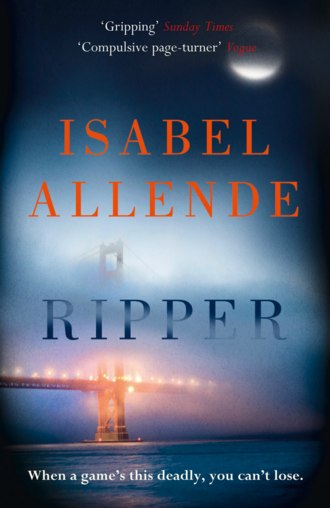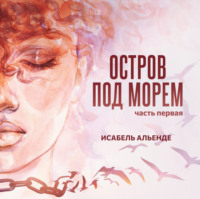
Полная версия
Ripper
“Well, hurry up, or I might just find myself a new henchman.”
“You can try! I’d like to see anyone else who’s prepared to put up with you.”
“You love me, Gramps?”
“Nope.”
“Me neither,” Amanda said, and flung her arms around his neck.
Blake Jackson buried his nose in his granddaughter’s mane of frizzy hair, which smelled of salad—she washed it with vinegar—and thought about the fact that in a few months she would be off to college, and he would no longer be around to protect her. He missed her already, and she had not even left yet. He flicked through fleeting memories of her short life, back to an image of the sullen, skeptical little girl who would spend hours hiding in a makeshift tent of bedsheets where no one was admitted except Save-the-Tuna, the invisible friend who followed her around for years, her cat Gina, and sometimes Blake himself, when he was lucky enough to be invited to drink make-believe tea from tiny plastic cups.
Where on earth does she get it from? Blake Jackson had wondered when Amanda—aged six—first beat him at chess. It could hardly be from Indiana, who floated in the stratosphere preaching love and peace half a century after the hippies had died out, and it wasn’t from Bob Martín, who had never finished a book in his life. “I wouldn’t worry too much about it,” said Celeste Roko, who had a habit of showing up unannounced, and who terrified Blake Jackson almost as much as the devil himself. “Lots of kids are precocious at that age, but it doesn’t last. Just wait till her hormones kick in, and she’ll nosedive to the usual level of teenage stupidity.”
But in this case the psychic had been wrong: Amanda’s intelligence had continued to develop throughout her teenage years, and the only impact her hormones had was on her appearance. At puberty she grew quickly, and at fifteen she got contact lenses to replace her glasses, had her retainer removed, learned to tame her shock of curly hair, and emerged as a slim young woman with delicate features, her father’s dark hair, and her mother’s pale skin, a young woman who had no idea how beautiful she was. At seventeen she still shambled along, still bit her nails, and still dressed in bizarre castoffs she bought in thrift stores and accessorized according to her mood.
When her grandfather left, Amanda felt, for a few hours at least, that she was master of her own space. Three months from now she’d graduate from high school—where she’d been happy, on the whole, despite the frustration of having to share a dorm room—and soon she’d be heading for Massachusetts, to MIT, where her virtual boyfriend, Bradley, was already enrolled. He’d told her all about the MIT Media Lab, a haven of imagination and creativity, everything she had ever dreamed of. Bradley was the perfect man: he was a bit of a geek, like her, had a quirky sense of humor and a great body. His broad shoulders and healthy tan, he owed to being on the swim team; his fluorescent yellow hair to the strange cocktail of chemicals in swimming pools. He could easily pass for Australian. Sometime in the distant future Amanda planned to marry Bradley, though she hadn’t told him this yet. In the meantime, they hooked up online to play Go, talked about hermetic subjects and about books.
Bradley was a science-fiction fan—something Amanda found depressing; more often than not science fiction involved a universe where the earth had been reduced to rubble and machines controlled the population. She’d read a lot of science fiction between the ages of eight and eleven before moving on to fantasy—imaginary eras with little technology where the difference between heroes and villains was clear—a genre Bradley considered puerile and pernicious. He preferred bleak dystopias. Amanda didn’t dare tell him that she’d read all four Twilight novels and the Millennium trilogy; Bradley had no time for vampires and psychopaths.
Their romantic e-mails full of virtual kisses were also heavily laced with irony so as not to seem soppy; certainly nothing explicit. The Reverend Mother had expelled a classmate of Amanda’s the previous December for uploading a video of herself naked, spread-eagled, and masturbating. Bradley had not been particularly shocked by the story, since some of his buddies’ girlfriends had made similar sex tapes. Amanda had been a little surprised to discover that her friend was completely shaven, and that she’d made no attempt to hide her face, but she was more shocked by the hysterical reaction of the nuns, who had the reputation of being tolerant.
While she messaged Bradley online, Amanda filed away the information her grandfather had managed to dig up on the Case of the Misplaced Baseball Bat, along with a number of grisly press cuttings she’d been collecting since her godmother first broadcast her grim prophecy. The kids who played Ripper were still trying to come up with answers to several questions about Ed Staton, but already Amanda was preparing a new dossier for their next case: the murders of Doris and Michael Constante.
Matheus Pereira, a painter of Brazilian origin, was another of Indiana Jackson’s admirers. But their love was strictly platonic, since Matheus devoted all his energies to his painting. Matheus believed that artistic creativity was fueled by sexual energy, and when forced to choose between painting and seducing Indiana—who didn’t seem interested in an affair—he chose the former. In any case, marijuana kept him in a permanent state of zoned-out bliss that didn’t lend itself to amorous schemes. Matheus and Indiana were close friends; they saw each other most days, and they looked out for each other. He was constantly harassed by the police, while she sometimes had problems with clients who got too fresh, and with Deputy Chief Martín, who felt he still had the right to interfere in his ex-wife’s affairs.
“I’m worried about Amanda,” Indiana said as she massaged Matheus with eucalyptus oil to relieve his sciatica. “Her new obsession is crime.”
“So she’s over the whole vampire thing?”
“That was last year. But this is more serious—she’s fixated on real-life crimes.”
“She’s her father’s daughter.”
“I never know what she’s up to. That’s the problem with the Internet—some pervert could be grooming my daughter right now, and I’d be the last to know.”
“It’s not like that, Indi. They’re just a bunch of kids playing games. By the way, I saw Amanda in Café Rossini last Saturday, having breakfast with your ex-husband. I swear that guy’s got it in for me, Indi.”
“No, he hasn’t. Bob’s pulled strings to keep you out of jail more than once.”
“Only because you asked him. Anyway, like I was saying, Amanda and I chatted for a bit, and she told me about their role-playing game, Ripper. Did you know that in one of the murders, the killer shoved a bat—”
“Yes, Matheus, I do know,” Indiana interrupted. “But that’s just what I mean—do you really think it’s healthy for Amanda to be obsessed with gruesome things like that? Most girls her age have crushes on movie stars.”
Matheus Pereira lived in an unauthorized extension on the flat roof of the Holistic Clinic, and in practice he also acted as the building supervisor. This ramshackle shed that he called his studio got exceptionally good light for painting and for growing marijuana—which was purely for his personal use and that of his friends.
In the late 1990s, after passing through various hands, the building had been sold to a Chinese businessman with a good eye for an investment, who had the idea of turning it into one of the health and wellness centers flourishing all over California. He had the exterior painted and hung up a sign that read HOLISTIC CLINIC to distinguish it from the fishmongers in Chinatown. The people to whom he rented the units on the second and third floors, all practitioners of the healing arts and sciences, did the rest of the work. A yoga studio and an art gallery occupied the two ground-floor units. The former also offered popular tantric dance classes, while the latter—inexplicably called the Hairy Caterpillar—mounted exhibitions of work by local artists. On Friday and Saturday nights, musicians and arty types thronged the gallery, sipping complimentary acrid wine from paper cups. Anyone looking for illicit drugs could buy them at the Hairy Caterpillar at bargain prices right under the noses of the police, who tolerated low-level trafficking as long as it was done discreetly. The two top floors of the Holistic Clinic were subdivided into small consulting suites that comprised a waiting room barely big enough for a school desk and a couple of chairs, and a treatment room. Access to the treatment rooms was somewhat restricted by the fact there was no elevator in the building—a major drawback to some patients, but one that had the advantage of discouraging the seriously ill, who were unlikely to get much benefit from alternative medicine.
Matheus Pereira had lived in the building for thirty years, successfully resisting every attempt by the previous owners to evict him. The Chinese businessman didn’t even try—it suited him to have someone in the building outside office hours, so he appointed Matheus building supervisor, giving him master keys to the units and paying him a notional salary to lock up at night, turn out the lights, and act as a contact for tenants in case of emergency or if any repairs were needed.
Matheus exhibited his paintings—inspired by German Expressionism—at the Hairy Caterpillar from time to time, though they never sold. A few of his canvases also hung in the lobby, and though the anguished, misshapen figures painted in thick angry brushstrokes clashed not only with the Holistic Clinic’s last vestiges of art deco but with its new ethos of promoting physical and emotional well-being in its clients, no one dared suggest taking them down for fear of offending the artist.
“This is all down to your ex-husband, Indi,” Matheus said as he was leaving. “Where else do you think Amanda gets her morbid fascination with crime?”
“Bob’s as worried about Amanda’s new obsession as I am.”
“It could be worse, she could be taking drugs—”
“Look who’s talking!” Indiana laughed.
“Exactly! I’m an expert.”
“If you want, I can give you a ten-minute massage tomorrow between clients,” Indiana offered.
“You’ve been giving me free massages for years now, so I’ve decided—I want you to have one of my canvases!”
“No, no, Matheus!” said Indiana, managing to disguise the rising panic in her voice. “I couldn’t possibly accept. I’m sure one day your paintings will be very valuable.”
Wednesday, 4
At 10:00 p.m., Blake Jackson finished the novel he’d been reading and went into the kitchen to fix himself some oatmeal porridge—something that brought back childhood memories and consoled him when he felt overwhelmed by the stupidity of the human race. Some novels left him feeling this way. Wednesday evenings were usually reserved for squash games, but his squash partner was on vacation this week. Blake sat down with his bowl of oatmeal, inhaling the delicate aroma of honey and cinnamon, and dialed Amanda’s cell phone number. He wasn’t worried about waking her, knowing that at this hour she would be reading. Since Indiana’s bedroom was some distance from the kitchen, there was no chance that she would overhear, but still Blake Jackson found himself whispering. It was best his daughter didn’t know what he and his granddaughter were up to.
“Amanda? It’s Kabel.”
“I recognized the voice. So, what’s the story?”
“It’s about Ed Staton. Making the most of the unseasonably warm weather—it was seventy degrees today, it felt like summer—”
“Get to the point, Kabel, I don’t have all night to chat about global warming.”
“ . . . I went for a beer with your dad and discovered a few things I thought might interest you.”
“What things?”
“The juvenile detention center where Staton worked before he moved to San Francisco was a place called Boys’ Camp, smack in the middle of the Arizona desert. He worked there for a couple years until he got canned in 2010 in a scandal involving the death of a fifteen-year-old kid. And it wasn’t the first time, Amanda—three boys have died at the facility in the past eight years, but it’s still open. Every time, the judge has simply suspended its license temporarily for the duration of the investigation.”
“Cause of death?”
“A military-style regime enforced by people who were either stupid or sadistic. A catalog of neglect, abuse, and torture. These boys were beaten, forced to exercise until they passed out, deprived of food and sleep. The boy who died in 2010 had contracted pneumonia; he was running a temperature and had collapsed more than once, and still they forced him to go on a run with the other inmates in the blazing, sweltering Arizona heat. When he collapsed, they kicked him while he was on the ground. He spent two weeks in the hospital before he died. Afterward, they discovered he had a couple of quarts of pus in his lungs.”
“And Ed Staton was one of these sadists,” concluded Amanda.
“He had a long record at Boys’ Camp. His name crops up in a number of complaints made against the facility, alleging abuse of inmates, but it wasn’t until 2010 that they fired him. Seems nobody gave a damn what happened to those poor boys. It’s like that Charles Dickens novel—”
“Oliver Twist. Come on, Kabel, cut to the chase.”
“So, anyway, they tried to hush up Staton’s dismissal, but they couldn’t—the boy’s death stirred up a hornet’s nest. But even with his reputation, Staton still managed to get a job at Golden Hills Elementary School in San Francisco. Doesn’t that seem weird to you? I mean, they must have been aware of his record.”
“Maybe he had the right connections.”
“No one took the trouble to look into his background. The principal at Golden Hills liked the guy because he knew how to enforce discipline, but a number of students and teachers I talked to said he was a bully, one of those candy-asses who grovel to their superiors and become viciously cruel the moment they get a little power. The world’s full of guys like that, unfortunately. In the end, the principal put him on the night shift to avoid any trouble. Staton’s shift ran from eight p.m. to six a.m.”
“Maybe he was killed by someone he’d bullied at this Boys’ Camp.”
“Your dad’s looking into the possibility, though he’s still clinging to the theory that the murder is gay-related. Staton was into gay porn, and he used hustlers.”
“What?”
“Hustlers—male prostitutes. Staton’s regular partners were two young Puerto Rican guys—your dad questioned them, but they’ve got solid alibis. Oh, and about the alarm in the school, you can tell the Ripper kids Staton was supposed to set it every night, only on the night in question he didn’t. Maybe he was in a hurry, maybe he planned to set it after he got back.”
“I know you’re still holding out on me,” Amanda said.
“Me?”
“Come on, Kabel, spit it out.”
“It’s something pretty weird—even your dad’s stumped by it,” said Blake Jackson. “The school gym is full of equipment—baseball bats, gloves, balls—but the bat used on Staton didn’t come from the school.”
“Don’t tell me: the bat was from some team in Arizona!”
“Like the Arizona Devils? That would make the connection to Boys’ Camp obvious, Amanda, but it didn’t.”
“So where did it come from?”
“Arkansas State University.”
According to Celeste Roko, who had studied the astrological charts of all of her friends and relatives, Indiana Jackson’s personality corresponded to her star sign, Pisces. This, she felt, explained her interest in the esoteric and her irrepressible need to help out every unfortunate wretch she encountered—including those who neither wanted nor appreciated her help. This made Carol Underwater the perfect focus for Indiana’s indiscriminate bursts of compassion.
The two women had met one morning in December 2011. Indiana was locking up her bike and, out of the corner of her eye, noticed a woman leaning against a nearby tree as though she was about to faint. Indiana rushed over, offered the woman a shoulder to lean on, led her to the Holistic Clinic, and helped her up the two flights of stairs to Treatment Room 8, where the stranger slumped, exhausted, into one of the rickety chairs in the waiting room. After she got her breath back, the woman introduced herself and explained that she was suffering from an aggressive form of cancer and that the chemotherapy was proving worse than the disease. Touched, Indiana offered to let the woman lie down on the massage table and rest for a while. In a tremulous voice, Carol Underwater said she was fine in the chair but that she would be grateful for a hot drink. Indiana left the woman and went down the street to buy a herbal tea, feeling bad that there wasn’t a hot plate in the consulting room so she could boil water. When she got back, she found that the woman had recovered a little and even put on brick-red lipstick in a pathetic attempt to smarten herself up. Pale and ravaged by the cancer, Carol Underwater looked simply grotesque, her eyes standing out like glass buttons on a rag doll. She told Indiana she was thirty-six, but the wig and the deep furrows made her look ten years older.
So began a relationship based on Carol Underwater’s misfortune and Indiana’s need to play the Good Samaritan. Indiana often offered therapies to bolster Carol’s immune system, but she always managed to find some excuse for postponing them. At first, suspecting the woman couldn’t afford to pay, Indiana offered the treatments for free, as she often did with patients in straitened circumstances, but when Carol continued to find excuses, Indi did not insist; she knew better than anyone that many people still distrusted alternative medicine.
The women shared a taste for sushi, walks in the park, and romantic comedies, and were both concerned about animal welfare. Carol—like Amanda—was a vegetarian but made an exception with sushi, while Indiana was happy just to protest against the suffering endured by battery hens and laboratory rats and the fashion industry’s use of fur. One of her favorite organizations was PETA, which a year earlier had petitioned the mayor of San Francisco to change the name of the Tenderloin district: it was inexcusable that a neighborhood should be named after a prime cut from some suffering animal; the area should be renamed after a vegetable. The mayor did not respond.
Despite the things they had in common, Indiana and Carol’s relationship was somewhat strained, with Indiana feeling she had to keep a certain distance, lest Carol stick to her like dandruff. The woman felt helpless and forsaken; her life was a catalog of rejections and disappointments. Carol saw herself as boring, with no charm, no talent, and few social skills, and suspected that her husband had only married her to get a green card. Indiana gently advised that she needed to rewrite this script that cast her as the victim, since the first step toward healing was to rid oneself of negative energy and bitterness. Instead, Indiana suggested, Carol needed a positive script, one that connected her to the oneness of the universe and to the divine light, but still Carol clung to her misfortune. Indiana sometimes worried she might be sucked into the bottomless chasm of this woman’s need: Carol phoned Indiana at all hours to whine, and waited outside her treatment room for hours to bring her expensive chocolates that clearly represented a sizable percentage of her social security check. Indiana would politely eat these, counting every calorie and with no real pleasure, since she preferred the dark chocolates flecked with chili that she shared with Alan.
Carol had no children and no family, but she did have a couple of friends Indiana never met who accompanied her to the chemotherapy sessions. Carol’s only topics of conversation were her cancer and her husband, a Colombian deported for drug dealing whom she was trying to bring back to the States. The cancer itself caused her no pain, but the poison being dripped into her veins was killing her. Carol’s skin was deathly pale, she had no energy, and her voice quavered, but Indiana nurtured the hope that she might recover—her scent was different from that of the other cancer patients Indi had treated. What’s more, Indiana’s customary ability to tune in to other people’s illnesses didn’t work with Carol, something she took as a positive sign.
One day, as they were discussing this at the Café Rossini, Carol talked about her fear of dying and her hopes that Indiana would help her—a burden Indiana felt unable to take on.
“You’re a very spiritual person, Indi,” Carol said.
Indiana laughed. “Don’t call me that! The only people I know who claim to be spiritual are sanctimonious and steal books about the occult from bookstores.”
“Do you believe in reincarnation?” Carol asked.
“I believe in the immortality of the soul.”
“I’ve frittered away this life, so if reincarnation really does exist, I’ll come back as a cockroach.”
Indiana lent Carol some books she always kept at her bedside, an eclectic mixture of tomes about Sufism, Platonism, Buddhism, and contemporary psychology, though she didn’t tell the woman that she herself had been studying for nine years and had only recently taken the first steps on the long path to enlightenment; for her to attain “plenitude of being,” and rid her soul of conflict and suffering, would take eons. Indiana hoped that her instincts as a healer would not fail her; that Carol would survive her battle with cancer and have time enough in this world to achieve the enlightenment she sought.
On that Wednesday in January, one of Indiana’s clients had canceled a Reiki and aromatherapy session, so she and Carol arranged to meet at the Café Rossini at five. It had been Carol who suggested the meeting, explaining on the phone that she’d just started radiotherapy, having had two weeks’ respite after her last course of chemo. Carol arrived first, wearing one of the usual ethnic outfits that did little to hide her angular figure and terrible posture: a cotton shift and trousers in a vaguely Moroccan style, a pair of sneakers, and lots of African seed necklaces and bracelets. Danny D’Angelo, a waiter who had served Carol on several occasions, greeted her with an effusiveness many of his customers had come to fear. Danny boasted that he was friends with half the population of North Beach—especially the regulars at the Café Rossini, where he’d been a waiter for so long that no one could remember a time before he worked there.
“Hey, girl, I gotta say that turban you got on is a lot better than that fright wig you been wearing lately,” were his first words to Carol Underwater. “Last time you were here, I thought to myself, ‘Danny, you gotta tell that girl to ditch the dead skunk,’ but in the end, I didn’t have the heart.”
“I have cancer,” said Carol, offended.
“ ’Course you do, princess, even a blind man can see that. But you could totally rock the shaved-head look—lots of women do it these days. So what can I get you?”
“A chamomile tea and a biscotti, but I’ll wait till Indiana gets here.”
“Indi’s like Mother fucking Teresa, don’t you think? I tell you, I owe that woman my life,” said Danny. He would happily have sat down and told Carol Underwater stories of his beloved Indiana Jackson, but the café was crowded and the owner was already signaling to him to hurry up and serve the other tables.
Through the window, Danny saw Indiana crossing Columbus Avenue, heading toward the café. He rushed to make a double cappuccino con panna, the way she liked it, so he could greet her at the door, cup in hand. “Salute your queen, plebs!” Danny announced in a loud voice, as he usually did, and the regulars—accustomed to this ritual—obeyed. Indiana planted a kiss on his cheek and took the cappuccino over to the table where Carol was sitting.
“I feel sick all the time, Indi, and I’ve hardly got the strength to do anything.” Carol sighed. “I don’t know what to do—all I want is to throw myself off a bridge.”
“Any particular bridge?” asked Danny as he passed their table, carrying a tray.








